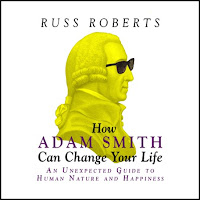Adam Smith is considered to be the father of liberal capitalism and free markets. His book "The Wealth of Nations" is considered as one of the most influential books on economics. Smith had written another book, "The Theory of Moral Sentiments", which is hardly remembered today, which was about human nature and how to live a fulfilling life. Russ Roberts' book "How Adam Smith can change your life" is a reflection and analysis of this lesser known book of Smith.
Self-Deception & Confirmation Bias
According to Smith, human beings are self-centred. For us our own life problems are much more important compared to big tragedies befalling humanity in some far away place.Human beings also have a big capacity for self-deception, sometimes unconsciously, so that we find an excuse to do things without listening to the voice of our self-conscience. Russ writes about this self-deception:Rather than see ourselves as we truly are, we see ourselves as we would like to be. Self-deception can be more comforting than self-knowledge. We like to fool ourselves.
A modern name for Smith’s insights about self-deception is confirmation bias. Confirmation bias happens when we filter reality through our biases, ignoring evidence that challenges or refutes what we believe and eagerly accepting evidence that confirms what we believe. ... Another modern name for the challenge of understanding our complex world with any precision comes from Nassim Taleb—the narrative fallacy. We like narratives that follow a nice, clean pattern. Evidence that fits the narrative is noted after the fact. Other evidence that doesn’t fit the narrative is discarded.
Among the persons offering advice motivated by self-interest and camouflaged as altruism, there are some examples of doctors, which brought to my mind many instances of distorted private medical services. For example, private nursing homes have much higher rates of Caesarean section instead of normal deliveries. Heart specialists in private hospitals advise much higher numbers of coronary artery bypass operations. I believe that this is a mechanism of self-deception, so that we doctors convince ourselves that we are not doing it for money but these operations are for benefiting those persons. However, this is not just about doctors, it is true for all kinds of professionals and private businesses. They don't see themselves as dishonest, many of them may be convinced that they do it to help others.
Everyday Actions Creating Civilization
The second idea from Smith that I want to touch in this post, is about small or minor actions by each of us, which taken alone are insignificant, but combined with similar actions of millions of other persons, together create the norms of our societies. Russ calls it this process, the "Emergent Order".
The economist Milton Friedman captured this strange paradox of small effects amounting to something significant when he said about supply and demand that the sum of negligible forces need not be negligible. So while my demand for apples has no impact on the price of apples, our demands all together, along with the decisions of suppliers, are what determine the price of apples. Not the greed of the grocer down the street, not my desire to get a good deal, but all our interactions together. And even though any one apple eater has no measurable or noticeable effect on the price, because she contributes an insignificant portion of the total demand for apples, apple eaters as a group have a very significant effect.Thus, Smith says that with our individual choices can lead to important social outcomes and this is how we create our society including our norms about morality, mutual trust and civilized behaviour.
This part of the book stimulated me to think about the kind of societies we are creating today. I think that when we choose our leaders and celebrities who behave in a certain way, they amplify the actions of their followers and thus determine the civilizational norms of our society. Through social media, such as Facebook and Twitter, these followers amplify their messages and gain strength from each other. The confirmation bias helps them to not see or listen to anything which does not fit in with their ideas. Thus, people with different ideas on the left and right of political spectrum, remain in their own circles and increasingly express themselves in ruthless and brutal terms, unable to see that they are mirror images of what they wish to fight.
At the same time, there is increasing acceptance of more extreme ideas. For example, when the news came about the sinking of a boat full of emigrants, some persons who are against emigrants, wrote on Twitter that it was good for feeding the fish. I think that this kind of thinking goes beyond being against emigrants - such ideas denote psychopath personalities. Thus, we creating societies where such expressions are acceptable, and persons can openly express such opinions without feeling ashamed about them. Across the world we have many political leaders, who encourage such ideas, sometimes using religions to justify them.
Conclusions
Adam Smith had written his book "The Theory of Moral Sentiments" in the mid-18th century and the original book is not so easy to read. Russ Roberts' book "How Adam Smith can change your life - An Unexpected Guide to Human Nature and Happiness" explains its ideas in an easier to understand manner. As you can see from my reflections above, these ideas from 18th century are still valid and have much to teach us. I think that Russ Robert's book is one of the more interesting books I have read recently.*****
#adamsmith #russroberts #bookreview







No comments:
Post a Comment
Thanks for visiting Arre Kya Baat Hai and for your comment! Please use a civilised language. Comments with embedded links are removed.